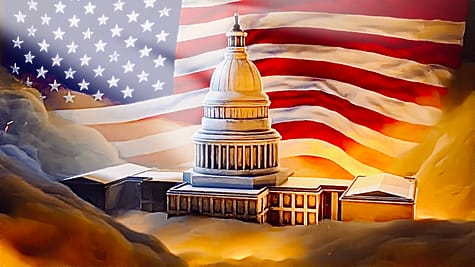GUEST EDITORIAL: What if we called it a sanction? USA trade policy
From Issue 3
With the hectic news cycle of the past year, you could be forgiven for not being informed the issue of tariffs against China. Donald Trump has raised taxes on trade with China, and, as with most actions in national politics, much debate has ensued over the tariffs. Trump says that the tariff increases will bring prosperity to America, but critics say the tariffs raise prices and ultimately cause more harm than good to the American economy. But what if the underlying beliefs of Trump’s critics could be right, yet benefits could still result from restricting trade with China? First, let me clarify some things about trade.
Despite all the confusing and unpredictable aspects of international trade, economists have begun to coalesce around similar viewpoints. A notable position that most economists agree upon that the benefits of free trade far outweigh the negatives. Economists are more prone than your average citizen to believe that tariffs are bad, free-trade deals like NAFTA are good, and that when foreign nations institute import tariffs the country concerned should disregard the tariffs; supporters of free trade will argue that tariffs only hurt the mother country. If you consider economic growth and prosperity your main goal, then you might agree with free-traders.
Let’s link these ideas of free trade to a current issue. As previously mentioned, the Trump administration has raised tariffs on the People’s Republic of China. The media often calls this phenomenon a “trade war.” Donald Trump is a protectionist, an anti free-trader, and he believes that tariffs help our country’s economy by “protecting American jobs” and encouraging consumers to “buy domestic.” Free-trade economists would argue Trump is gravely mistaken.
Free-trade economists would say that Trump is not only raising prices and artificially propping up decaying industries, but he is applying what is functionally a tax on the American people and harming not only the prosperity of America but that of the whole world. Free-trade economists could very well be right, and yet Trump’s plan might have some positive aspects; but these aspects are very different than the ones Trump is selling to his constituents.
Many are aware that the Chinese government commits numerous human rights abuses and engages in unethical practices in international diplomacy and business, such as threats of military action against Taiwan and intellectual property theft. China has historically been ruthless in quashing dissent, and the state does not have a good record with worker’s protections.
Another widely used trade tool is a sanction, which, in this context, is a trade embargo against countries that engage in hostile or unsavory practices. The United States uses sanctions against North Korea, the world’s worst human rights abuser, and Iran, a declared opponent of American interests. The United States does not impose these sanctions for the sake of economic growth; we even risk the possibility of diminished economic growth. We impose sanctions on countries for diplomatic reasons, which unfortunately for economists, still matter to some degree.
If Donald Trump stated that he wanted to impose trade restrictions on China in the name of human rights instead of economic growth, would free-trade supporters oppose the tariffs to the same degree the do now? Almost certainly not. Donald Trump’s reasoning behind his tariffs is likely incorrect; I would argue that the United States is not growing more prosperous as a result of the tariffs. But what if the free-trade community could use the trade war as an opportunity to strengthen the United States’s trade with the world’s free-market democracies while denouncing the repressive, controlling, anti free-trade attitudes inherent in the Chinese Communist Party.
Trump may have the wrong reasoning for enacting these tariffs, yet there could be some unintended positives that critics could accept. According to the democracy watchdog Freedom House, openness and democracy have been on the decline worldwide as autocracies like Russia and China rise in power. Many doubt the economic credibility of a tariff on China, and perhaps their opposition is well-founded. In an age where open governments and free markets continue to weaken, perhaps Americans should stop thinking of tariffs as the only trade limitations possible against China but instead think of them as sanctions; sanctions on a repressive regime.
I am not asking the supporters of free trade to endorse Trump’s trade policies; he still harbors unfavorable attitudes towards international commerce, and much of the reasoning behind the tariffs remains incoherent. Perhaps instead supporters of human rights and free trade should simply open their minds to restricting commerce with authoritarian powers in the name of a world safe for democracy and, counterintuitively, safe for free trade.










